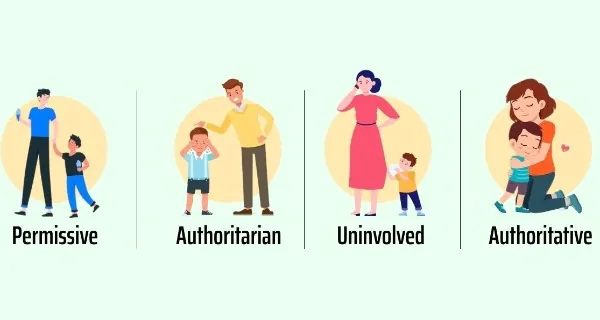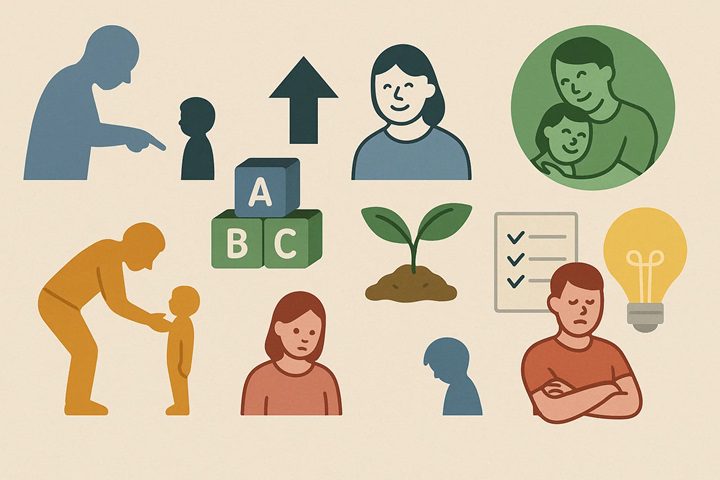Parenting is a critical aspect in defining the future of children. 4 parenting styles were identified after research conducted by developmental psychology and each of them has a strong impact on emotional, social and intellectual development. Keep reading, and you will learn about the 4 primary parenting styles, how they impact relationships, and practical ways to apply them in forming good and structured relationships.
What are the 4 parenting styles?
| Parenting style | Demandingness | Responsiveness | Summary |
| Authoritative | High | High | Guidance and warmth |
| Authoritarian | High | Low | Strict, less dialogue |
| Permissive | Low | High | Friendly, less boundaries |
| Uninvolved | Low | Low | Detached, neglectful |
These 4 different parenting styles all have lasting effects and vary in how the rules are established.



Authoritative parenting style
An authoritative parenting style incorporates strict demands and warm involvement. Parents who adopt this style are very strict but promote independence. They enable children to challenge rules and provide reasons as to why decisions are taken. Discipline is more of guidance instead of punishment, and it teaches children to know the consequences.
Effects on children:
- Increased self-esteem and confidence.
- Higher emotional and social abilities.
- Self-reliance and strength during childhood.
- Achievement in school is connected with well-organized homes.
- Good relationships based on respect and free flow of information.
- Successful problem-solving and life satisfaction, even at adolescence.
Authoritative parents depict the kind of behaviors they desire and this will be internalized and lead to balanced lives.
Authoritarian parenting style
Authoritarian parenting has strict rules and demands obedience and does not usually explain the necessity of such rules. There is a great absence of warmth and negotiation. It is about adherence along with regulation and discipline, which is implemented quickly and ruthlessly.
Effects on children:
- Poor self-esteem and confidence.
- More anxiety, depression and emotional withdrawal.
- Ineffective mental results and the possibility of behavioral disorders.
- Social problems and inadequate communication.
- Children can be violent or antisocial and have difficulties with peer relations.
- Inability to express emotions, to adjust to new surroundings and to learn to take failure.
Authoritarian children tend to be conformists and are not creative and flexible thinkers. Parent-child relationships weaken when rules replace open communication.
Permissive parenting style
Permissive parents provide love but with no boundaries. There is little discipline and little consistency in rules. Parents can be more friends than mentors.
Effects on children:
- Poor ability to understand boundaries and self-control.
- Problems with authority figures and orderly environments.
- Lack of proper decision-making skills and a higher risk of substance abuse.
- More creativity and expressiveness, but less emotional intelligence.
- Threat of anxiety and depression because of failure to cope.
- Lack of social interaction or inability to have friends.
Children raised in permissive homes often feel entitled and struggle with self-control and responsibility. They may not be consistent in their emotional and academic development.
Uninvolved parenting style
There is low responsiveness and high demandingness in uninvolved or neglectful parenting. In this type, parents do not offer much guidance or emotional support and instead focus on personal needs or hardship.
Effects on children:
- The worst consequences for development.
- Poor educational performance, low self-esteem, and a high possibility of substance abuse.
- Ineffective emotional control and social ability.
- Violence, crime and psychiatric problems may occur.
- Withdrawal, anxiety and phobia of relations.
- Uninvolved parents may inadvertently force children into premature independence without teaching decision-making skills.
Uninvolved parenting usually results in a dysfunctional cycle and a lack of life skills. Absence of interaction denies the children of the necessary emotional and developmental stimulus.
Master effective parenting styles and the assistance of a powerful parental tool.
Why understanding parenting styles matters
The concept of parenting styles was introduced by Diana Baumrind and later expanded by Maccoby and Martin. Baumrind’s theory of 4 parenting styles classifies common parental behaviors based on two dimensions: demandingness (control) and responsiveness (warmth).
Understanding these dimensions helps differentiate types of parenting styles and reveals how each influences a child’s development, emotional growth, and overall parent–child relationship.



The knowledge of parenting types and methods helps to understand why some children excel and others fail. Self-awareness enables the parents to change strategies to suit individual needs. It assists parents in balancing their reactionary emotions and setting limits.
Parenting behavior teaches children styles and patterns of relationships observed in the home. Mental health, academic achievement and social success are dependent on the kind of arrangement and warmth provided by parents. Thus, understanding individual parenting styles will enable parents to create healthier relationships and families.
What is the healthiest parenting style?
There are countless results that authoritative parenting is the healthiest style. This theory sets high standards for the children and offers them emotional support and effective communication. Autonomy, respect and strict direction are all beneficial to children.
Parenting approaches for each family cannot be uniform. The majority of parents mix up the elements of various styles and change according to the situation. Moreover, there is the cultural context of expressing discipline and affection. Similarly, the family interactions are also determined by societal expectations.
Flexible and self-reflective parents can better nurture their children’s individual needs. Specialists suggest the combination of directions with knowledge, changing with the development of children. There is no universal style that is appropriate across all families and situations.
When to adapt your parenting style?
The needs of children vary depending on the environment, temperament, and age. Parents have the advantage of modifying their strategy to these changes:
- Childhood requirements contain building and inculcation.
- Children of school age need greater independence and definitiveness.
- Teenagers have a favorable appreciation of freedom and confidence.
Crises of families or security issues require a review of rules and reactions. Similarly, nurturing and adaptive behaviours enhance attachment between parents and children. The most crucial aspect is still for parents to monitor children and adapt to the child’s growing needs. Flexibility creates resiliency among both parents and children in a way that promotes security and development.
Strategies for developing an authoritative approach
Parents can grow to have authoritative qualities at a conscious level:
- Self-awareness and self-reflection: Consider interactions, discipline and communication regularly to enhance responses.
- Parents should balance warmth and discipline by maintaining supportive relationships and setting consistent, reasonable rules.
- Improve the communication and empathy: Be an active listener and confirm the feelings of children and then give guidance.
- Provoke no cruel penalties, only logical: Relate discipline and conduct with a logical cause-and-effect.
- Promote independence: Parents should promote independence by letting children make decisions while guiding them without micromanaging.
- Model behavior: Parents should model the patience, respect, and values they want their children to develop.
- Encourage problem-solving: Give children the ability to solve problems and make decisions, and create self-confidence.
Together, these strategies help to establish a conducive environment that helps the children to succeed in their studies, emotionally and socially. Similarly, you can rely on tools like FlashGet Kids to keep children safe in the digital world. This parental control app offers monitoring as well as restrictive features to keep kids away from inappropriate content and dangerous people on the internet.
Practices of 4P and 4S in parenting
The 4Ss and the 4Ps of parenting are crucial methods of ensuring that there are good parent-child relationships and emotional growth.
There is purposeful, facilitative parenting that is guided by the 4 Ps.
- Practice: You need to help kids practice tackling different situations beforehand. This practice will make them feel more confident, providing them with plenty of alternative actions to choose from when they face challenges.
- Praise: A child’s self-esteem is mostly dependent on how their parents treat them at an early age. Honest praise greatly encourages them to develop complex skills and habits.
- Point Out: Rely on your child’s surroundings to point out behavior that you deem as appropriate or inappropriate. This will make your child more observant and more likely to get aware of what you point out.
- Prompt: Frequently bring up what you expect from your children to keep their minds on track. However, there is a fine line between nagging your kids and prompting them to be responsible adults.
A child’s core emotional needs are summarized through the “4S”.
- Safe: This means to offer physical and emotional security so that children are safe.
- Seen: This means perceiving and validating all the emotions through empathy and understanding.
- Soothed: This means to calm down and reassure children when they are angry. This can teach children to be more in control of their emotions.
- Secure: This involves developing a cohesive, trusting relationship that builds emotional stability and assurance.
A combination of these values is helpful in promoting an authoritative parenting style, which includes warmth, structure, empathy, and positive guidance. They encourage proper development since they satisfy the emotional needs of children without being ambiguous. It is a moderate practice that promotes resilience and well-being, as well as healthy parent-child relationships.
Final words
The holistic development and character formation of children are closely tied to parents’ conscious parenting. The authoritative style is the most effective one since it incorporates the elements of structure, empathy, and respect. Furthermore, flexibility in parenting styles promotes self-esteem in kids at each stage of development.
Deliberate warmth, self-reflection, and healthy boundaries enable parents to raise competent and self-assured children. There is no ideal way to do it; it is important to mix the strategy and learn from how your kids respond. All families have a growth, communication and supportive relationships dedication.
The styles of parenting leave a legacy. Caring interaction creates strength, understanding, and long-term relationships. So, pay attention to the development of love, trust, and security as these are the pillars of successful parenthood.

